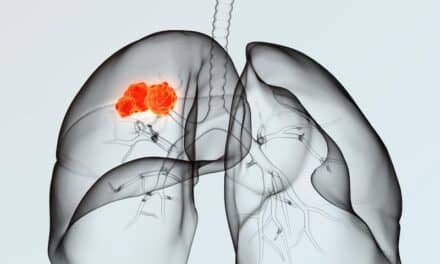Illumina, San Diego, recently launched TruSight Oncology 500, a comprehensive pan-cancer assay designed to identify known and emerging tumor biomarkers. The assay utilizes both DNA and RNA from subject tumor samples to identify key somatic variants underlying tumor progression, such as small DNA variants, fusions, and splice variants. TruSight Oncology 500 can measure tumor mutational burden (TMB) and microsatellite instability (MSI), features that are potentially key biomarkers for emerging immunotherapies. The assay is designated for research use only.
Molecular testing for lung cancer has been at the forefront of precision oncology. The use of targeted therapies is associated with improved outcomes in some patients, but currently requires testing of multiple biomarkers, such as EGFR mutations, ALK fusions, and ROS fusions, among others.
TMB has recently gained prominence as an important oncology biomarker, with high TMB suggesting that a patient will likely experience a better response to treatment with immune checkpoint inhibitors. Reliable measurement of TMB in a tumor-only workflow requires comprehensive sequencing of approximately 1Mb or greater, specific and sensitive variant calling, and the use of bioinformatic methods to flag and remove germline variants. TruSight Oncology 500 is among the largest and most comprehensive biomarker panels currently available, making it easier for cancer researchers to interrogate the increasing number of biomarkers required to fully understand a patient’s optimal therapeutic course.
“The importance of tumor mutational burden as a biomarker to predict immune checkpoint inhibition response continues to grow in non-small cell lung cancer,” says Albrecht Stenzinger, MD, a pathologist at University Hospital Heidelberg. “However, the detection of somatic biomarkers, such as ALK fusions and EGFR small variants, is also vital. The workflow of TSO 500, using both DNA and RNA, enables laboratories to evaluate TMB as well as small DNA variants and fusions simultaneously, ultimately saving time and preserving precious samples.”
“By focusing on our most differentiated oncology products, we can meet the needs of our customers and provide a comprehensive NGS panel that includes all of the known and anticipated biomarkers associated with targeted and immune-based therapies,” says Garret Hampton, executive vice president for clinical genomics at Illumina. “As we move to bring a future in vitro diagnostic version through regulatory approval, we will be able to set the standard for accurate and reproducible testing.
“Today’s value in the capability to call for TMB is in line with current research and emerging guidelines,” Hampton adds. “But the promise that TruSight Oncology 500 holds for the future identification of biomarkers makes it a robust solution for this rapidly evolving field.”
For additional information, visit Illumina.




